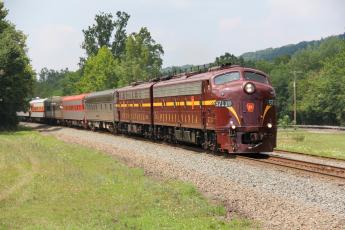Related Topics
Railroad Town
 It's generally agreed, railroads failed to adjust their fixed capacity to changing demands. It's less certain Philadelphia was pulled down by that collapsing rail system.
It's generally agreed, railroads failed to adjust their fixed capacity to changing demands. It's less certain Philadelphia was pulled down by that collapsing rail system.
Great Depression (1929-1939)
New topic 2012-08-29 11:32:11 description
Warnings of Impending Trouble for the PRR

|
| Pennsylvania Railroad |
The success of an excellent book, The Wreck of the Penn Central, has stamped the decline of the railroad industry with the problems of the merger of the New York Central and Pennsylvania railroads. There definitely was mismanagement of that merger, which quite possibly should never have occurred, and unions surely did contribute to excessive costs of running the merged lines. Government regulation was definitely slanted toward maintaining uneconomic railroad capacity for political reasons and tangled the struggling corporations in mountains of red tape which prevented timely responses to problems. And the tax-subsidized highways and airlines tilted the balance against the fair competition with a railroad industry which had long been unaccustomed to the competition. All of these difficulties prevented the railroads from meeting new challenges, and like wolves around a wounded caribou brought it to the ground.

|
| Smoke Signals |
But there is a larger picture explaining the toppling of the railroads, particularly when the causes of Philadelphia's industrial decline are the focus of examination. The whole fabric of Philadelphia's economy was interwoven with the national dominance of the Pennsylvania Rail Road, which was in turn intertwined with the national importance of coal and steel production, a creation in the 19th Century of J. Edgar Thomson. It was not one heavy industry which disappeared, it was three of them. It was not just Philadelphia which faded, it was the whole "Rust Belt" from Philadelphia to St. Louis. Baltimore and Cleveland declined even more than Philadelphia, for example. At the end of World War II, this was the only region of heavy industry still standing in the whole world; for a while, its uncompetitive profits were astounding. Unionized labor made amazing gains in wages and power, management grew fat and slack; the government made sure it was so, but competitive industries had an easy time lobbying for that outcome. As late as 1968, PRR shares which were to fall to $15 within ten years were selling for $80, and an old joke was current. A mythically representative Philadelphia father was said to advise his daughters, "Sell your body if you must, but never, never, sell your Pennsy stock." All of this public pressure combined to encourage unions and government to force management to take the easy way out huge deferred maintenance during ten years of depression and five more years of war had built up. And meanwhile, the biggest deferred problem of all was allowed to build up. Every congressman for decades had demanded unprofitable rail service for his district, insisting the trains make too many unprofitable stops along the way, and at night, and on weekends. Every business must adjust capacity to changing customer demands, that's just business, but an inability to adjust capacity to changing circumstances is what's fatal.
Originally published: Thursday, November 04, 2010; most-recently modified: Friday, May 31, 2019